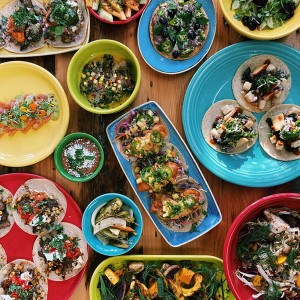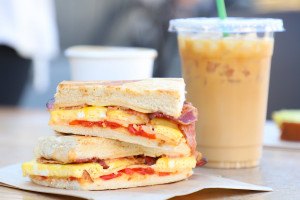Tiffani Faison Talks Ego, Her Latest Fool’s Errand, and Five Years of Sweet Cheeks
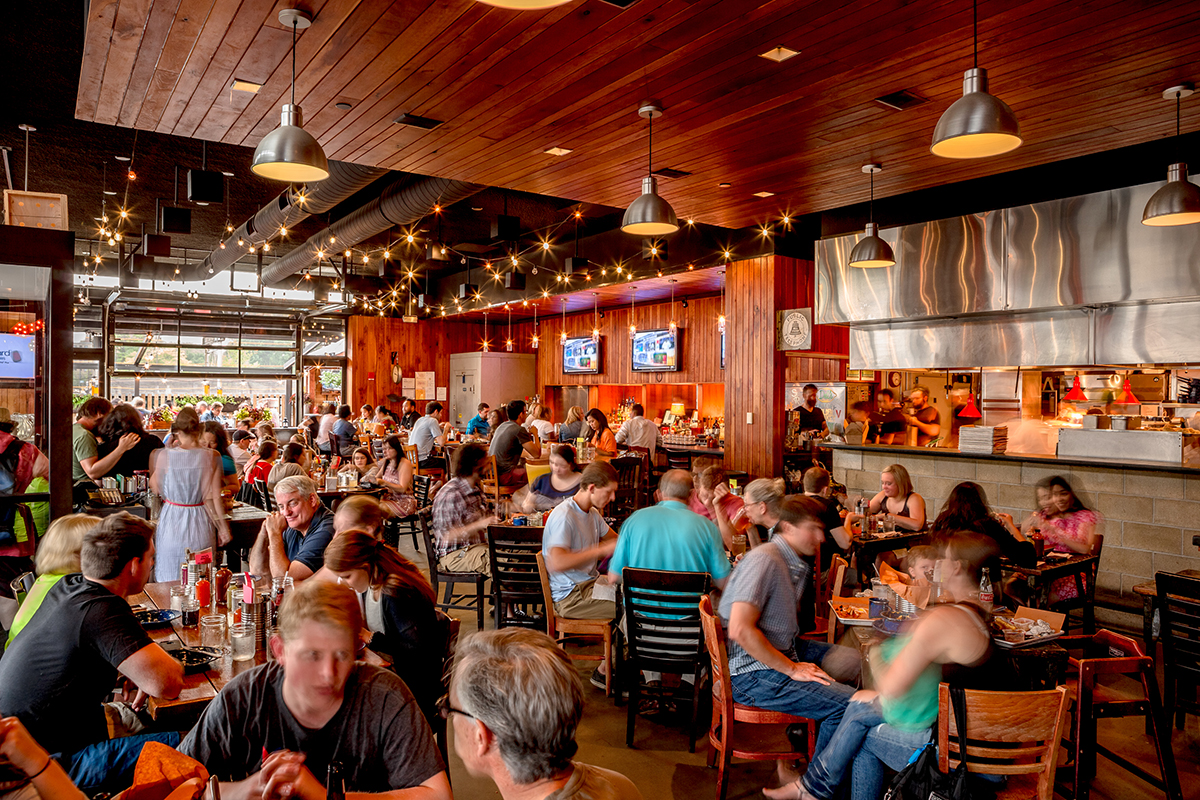
Sweet Cheeks. / Photo by Mike Diskin
Five years and a little more than six months ago, Tiffani Faison did not want to open a restaurant in the Fenway neighborhood. Now, she’s celebrating five years of her first baby, Sweet Cheeks, and she’ll debut her third restaurant on Boylston Street in early 2017.
Details on Fool’s Errand—yes, it’s named for a reason—are still close to Faison’s chest, but she will share that it will be totally different from her barbecue joint next door, and the vibrant Tiger Mama just down the block. For one, it will be a ticketed reservation system for only 12 seats.
“We have seen residents [here] and also the city recognize Fenway as a neighborhood that has a lot to offer. Our guests who live around here have been extraordinary, making this their home and Tiger their home, and that is the most encouraging green light ever,” she says, for setting her sights on this Fool’s Errand.
And she couldn’t be more grateful for that. Sweet Cheeks is a default answer for go-to New England barbecue, and it catapulted Tiffani Faison to the top echelon of Boston chefs.
Clad in a Pearl Jam at Fenway concert T-shirt, Faison sat down with Boston to reminisce about the days when her investors couldn’t believe she wasn’t going to serve cornbread, and to look at her future in the shiny new Fenway she helped to build.
This conversation has been edited for length and clarity.
Did you [open on 11/11/11] on purpose?
No. When you open a restaurant, you don’t do anything on purpose. You’re just like, it’s good, open the door.
What do you remember from that first day?
It’s such a blur. Dan, do you remember the first ticket?
[Chef de cuisine Dan Raia] No. It was probably biscuits.
[Tiffani Faison laughs.] Yeah, I remember people being like, will your cornbread be sweet? We’re not doing cornbread. One of my investors was upset about it. I was like, give biscuits a chance.
The first night we had the smoker in, it was around Halloween. Dan was on an air mattress downstairs in the kitchen, [Faison’s wife and business partner Kelly Walsh] and I were on an air mattress upstairs in the office. We just didn’t want to burn the place down. Then we realized we weren’t going to burn it down. I remember just looking at Dan and being like, OK, I think we can go, and tweeting about it. I thought people wouldn’t really know we were open yet. Then it got picked up, and I remember looking outside—we weren’t taking reservations at that point—and there was a line from here to Tiger. It’s like being at a high school dance: Like, well, I hope someone asks me to dance. And then they do, and it’s terrifying.
I remember thinking, coming from a finer dining background, If I screw barbecue up, I will never get a shot to do anything else. Also, we’d raised money for it, so you’re sitting in front of investors, and saying, ‘I’m going to take your money and make this return for you.’
So, expectations were high.
Really high. We have an incredible staff we’ve built over the past five years, but it took some time. The first year, we went through a lot of staff.
Then there are things I learned. For instance, in a fine dining restaurant, there is no leaving dirty napkins on the table. I was like a crazy person [about that]. Then, I learned I was making our guests really self-conscious. They’re in the middle of eating ribs, and we’re cleaning up their mess. We say this all the time, opening restaurants is like having a kid. You have high hopes for it, you have things you want, but ultimately, it’ll show you what it needs to be. In some ways, you have to get out of its way.
From start to finish, how long did it take you to open Sweet Cheeks? And how did that compare to Tiger Mama?
I don’t think because it was 2011 versus 2016 is really the difference. A lot of things move faster in the world now, but having someone physically build something in your restaurant is not sped up by technology.
I came and saw Sweet Cheeks the first time in May [2011], when it was Cambridge 1. I sat at the edge of the bar. I [didn’t] want to be in Fenway, because I was still thinking about finer dining. But it just came over me, like, yes, we do this [space], and we do barbecue, and we do it now. It was hard to convince people that, coming from a fine dining background, that I could do barbecue. [Faison gives a huge eyeroll.] And then, for Tiger, it was hard convincing people that a barbecue chef could do a finer dining Thai restaurant. They all had their own [opening issues]. If it ever gets easy, I’d be surprised.
You were dragged kicking and screaming, but now you’re opening a third concept here.
We joke that Fenway was gas stations, liquor stores, and gay bars. When I was 22, I used to ride the T from Eastie and come over here for Avalon on Sundays, and go to Machine. This is where I partied. Once it was barbecue, the idea of being afraid of the Fenway went away. And since then, it’s evolved into this actually great, emerging neighborhood that now everyone’s paying attention to.
Having this opportunity in a major American city to be in the city, and affect a neighborhood, and the opportunity to have a presence in a neighborhood like this, is very cool. It’s not lost on me at all.
So, it immediately clicked in this location, we talked about Tiger Mama being a fit, and I’m going to ask you about your third venture, too. How do you select what concept a neighborhood like Fenway needs, or does the concept select you?
The neighborhood dictated Sweet Cheeks. Being next to Fenway, and also, I remember being really homesick. I was always stymied about why there wasn’t a good barbecue restaurant, why there wasn’t a good Southern restaurant. Then I saw this and thought—It was a little hard to let go. You don’t realize how much ego there is in opening a restaurant until you go, ‘I’m not going to open this crown jewel, $100-a-head restaurant.’ Ultimately, it taught me a great deal about who I am and what I want in this business and world.
Then, the evolution of the neighborhood allowed for freedom in going, ‘OK, what do I want to do?’ The size of the space, doing something that is a bit of a nod to Sweet Cheeks without being directly competitive. Sometimes [those decisions are] strategic, sometimes they’re not.
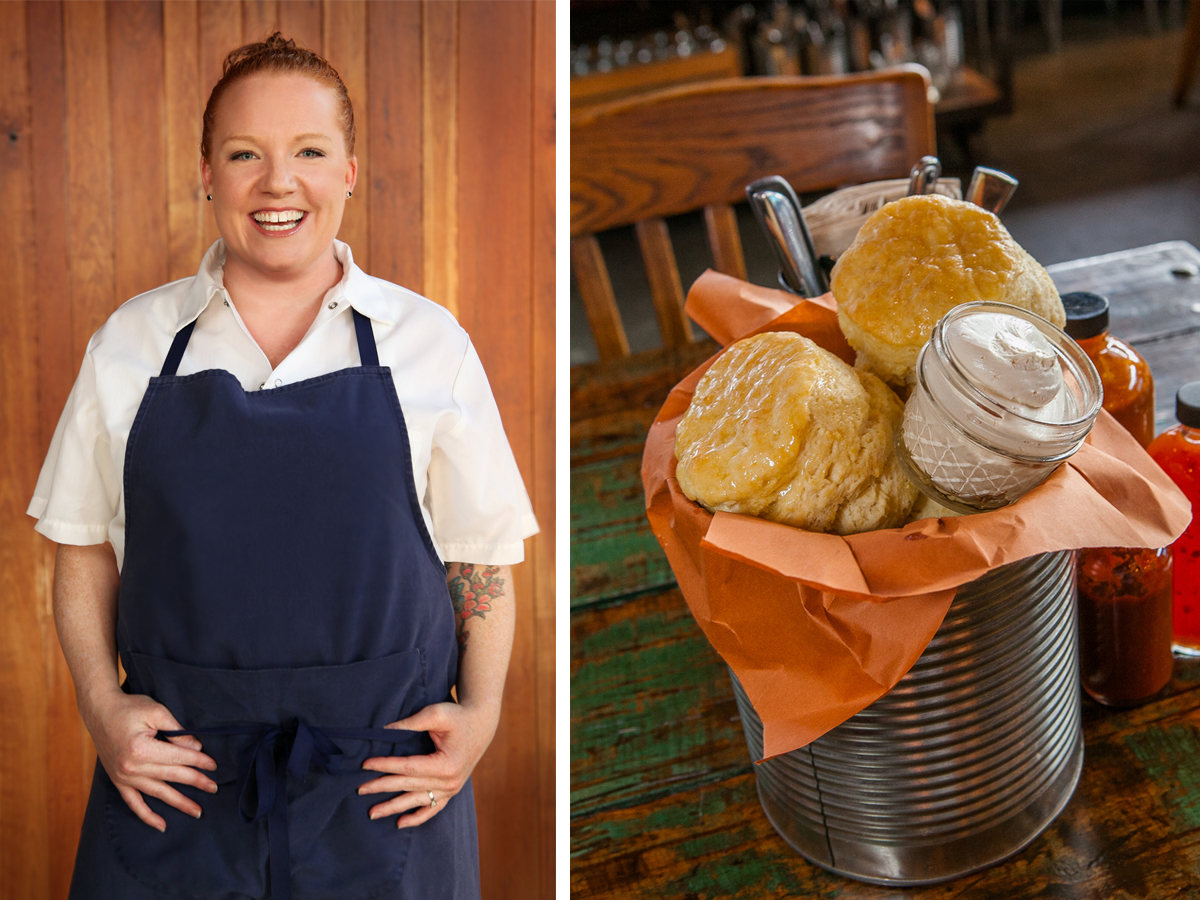
Tiffani Faison headshot by Dan Watkins / Sweet Cheeks biscuits photo by Mike Diskin
Has the menu or programming changed here at all? I remember you did ramen for a hot minute.
I’m a huge ramen fan. We did it on Monday nights. It was passion project-meets-good business decision. It did the things we wanted it to do. We go so hard in the summer, you want everyone to take a little bit of a breath in the winter, and it’s hard to be that when we were doing ramen, And we saw the response to it kinda die off a bit, to be honest, which I get. There are more ramen options now. We might do one or two nights this winter, but I don’t think every Monday night will be a thing.
So yeah, nothing’s really changed.
People scream at us when we change things. Here’s one of the greatest things you don’t see coming: How much people can make your restaurant theirs. That has been the greatest gift out of this restaurant for the past five years.
We see dads coming in when their wives are in labor, and we can spot them now. They are always by themselves, they always head for the bar, they can barely sit down. We see families dealing with sick family members that come in. Our softball team has been—[pauses, choking up]—a champion for us, in all ways. The community that showed up for our Orlando fundraiser. We have an engaged couple that met here, working for us; we’ve seen people ask each other to marry them at tables. When you start to open a restaurant, you don’t think about what it will be in the context of the community. It’s been unbelievable and touching, obviously.
I want to ask you about challenges that have mounted since you’ve opened this place, like staffing, and maybe healthcare?
If [the next four years see] the fever pitch and the tone of the race, I have some concerns about the safety and welfare of our staff in various forms. Massachusetts was on the forefront of [healthcare]. Politically, there are question marks, but I think we make smart decisions at the state level that keep us from really finding a rabbit hole in that way.
More than anything else, it’s the same thing everyone talks about. We’ve never seen a growth spurt in this city quite to this level, at least in the past 50 or so years. As a human being, I believe everyone should make a living wage. As a business owner, I look at what that minimum wage really looks like, and it would sink a business. No one knows how to get to where we need to be right now, in terms of doing the right thing for everyone.
Is Eataly exciting? Sure. Five years from now, are we going to say, Wow, I wish we would have chosen our small restaurants over Eataly? It’s 400 back-of-house employees. I have lost four, that I know of. The growth of Boston is exciting, but we’re also seeing the many national chains come in, and they are able to pay more. We all talk about eating local, that sort of thing. We have to talk about the sustainability of our restaurant community. What does it mean to eat locally now? Supporting local chefs at businesses here, that live here. I’m not saying solely, but it’s important.
Have you contemplated adopting one of the angles other Boston chefs have to close the livable wage gap?
We’ve considered a couple different options. We’ve actually had a few conference calls with [the Union Square Hospitality Group] in New York. They’ve been as open as possible with what they’re doing.
I think we’re close to implementing something, certainly at Tiger, and ultimately here. It’s the right thing to do. [But] There’s no way a restaurant can absorb a livable wage for all its people and still charge something that seems reasonable to the guests. One of the things USHG has found is you cannot raise the price of a soda or a cup of coffee 20 percent. It just doesn’t fly.
Ultimately, one of the effects [increasing minimum wage] does have is it creates a standard of living that is quite frankly easier for chains to meet. We’re talking about it now. It’s really important that when we make this decision, it’s smart and informed and we’re committed to it, so that it’s not a moving target for our guests.
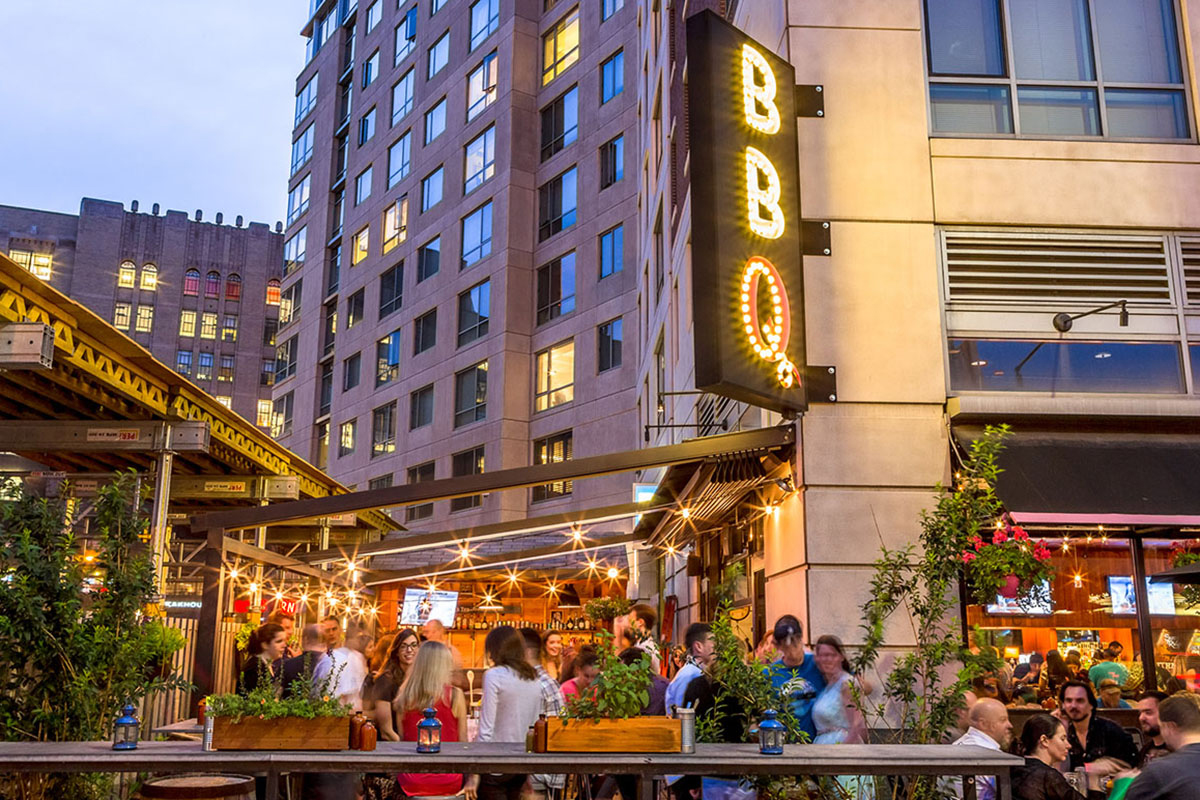
Sweet Cheeks. / Photo by Mike Diskin
So, that brings me to my next question. What else can you tell me about your third concept?
We’re expecting a January opening. It’s literally the other side of the wall from Sweet Cheeks. You won’t be able to get to it from Sweet Cheeks; it will have one entrance, the front door. It’s 12 seats. We’re doing something different. It will be self-sustaining restaurant, and we’ll open as a bar bar at like, 10. At some point, we’re going to sell tickets to the seats.
It’s really about changing the idea of people’s commitment to dining. If you buy a ticket to the movies, then you don’t go, you don’t ever ask them to refund your ticket. You didn’t go to the movies. When something is 12 seats, it’s more consequential if people just don’t show up. Not just financially, but for the vibe of the night. [The tickets will be] transferrable, if you buy a ticket and you can’t go, you can give it to someone else, sure. But to make sure we’re taking care of business on both sides, and to let people really know we’re really preparing for them. We’re doing things that feel really bespoke for their arrival that night.
Will there be any space for walk-ins?
We’ll see.
After 10 p.m.?
Yes.
Will there be food late night?
Yes. Sorry to be so cagey. It’s really an opportunity to do something we think is lovely, and guest-forward, and also it’s a little bit of a chef’s dream to have 12 seats and just kinda, ya know, cook.
Is it going back to your fine dining roots?
No. We talked about the ego—that just started to erode, standing at that pass, sending barbecue out, watching people love it, eat in a completely un-self-conscious way that just felt very convivial, changed everything for me. I can’t say ‘never’ to anything, but to do something where a diner might feel self-conscious is not attractive to me.
Is opening a third concept, even with just 12 seats, an example of a way you’re trying to give your staff room to grow?
Yeah. Moe Isaza will be the point person on the bar there. Formerly of West Bridge and Baldwin Bar, he’s running beverage for the company now for about six or seven months. We’ll all be Fools together. It feels communal. Clem Hsu will be with us, who’s been at Atelier Crenn, and Tim Maslow will be with it, as well. It’s a brain trust of really talented people.
Sounds like it. So, I notice your Pearl Jam at Fenway T-shirt.
Can I tell you how cool it was? I nearly got a Pearl Jam tattoo when I was 18; I’m really glad I didn’t. But I was just in love with Eddie Vedder. To see them, in my backyard, it was really cool.
Totally. Your new spot sounds unique, and Fenway’s growth has been so interesting, with so many focused concepts. How has this neighborhood become a place where you can open this bespoke third restaurant?
Our guests who live around here have been extraordinary, making this their home and Tiger their home, and that is the most encouraging, green light ever. To that end, I have to give credit to [Steven] Samuels and his vision for this. Can you imagine? People must have thought he was nuts. They’ve been really conscious about putting the right people in the right places. They hold the line, and they have been extraordinary to single operators, and local operators. They have been a true partner to me. Not just business-wise, but also in terms of encouraging and being here and being part of this family.
Sweet Cheeks is closed Monday night, November 14, for a private party to celebrate its fifth anniversary. It’s open daily from 11:30 a.m.-10 p.m. (11 p.m. on weekends).
1381 Boylston St., Boston, 617.266.1300, sweetcheeksq.com.

